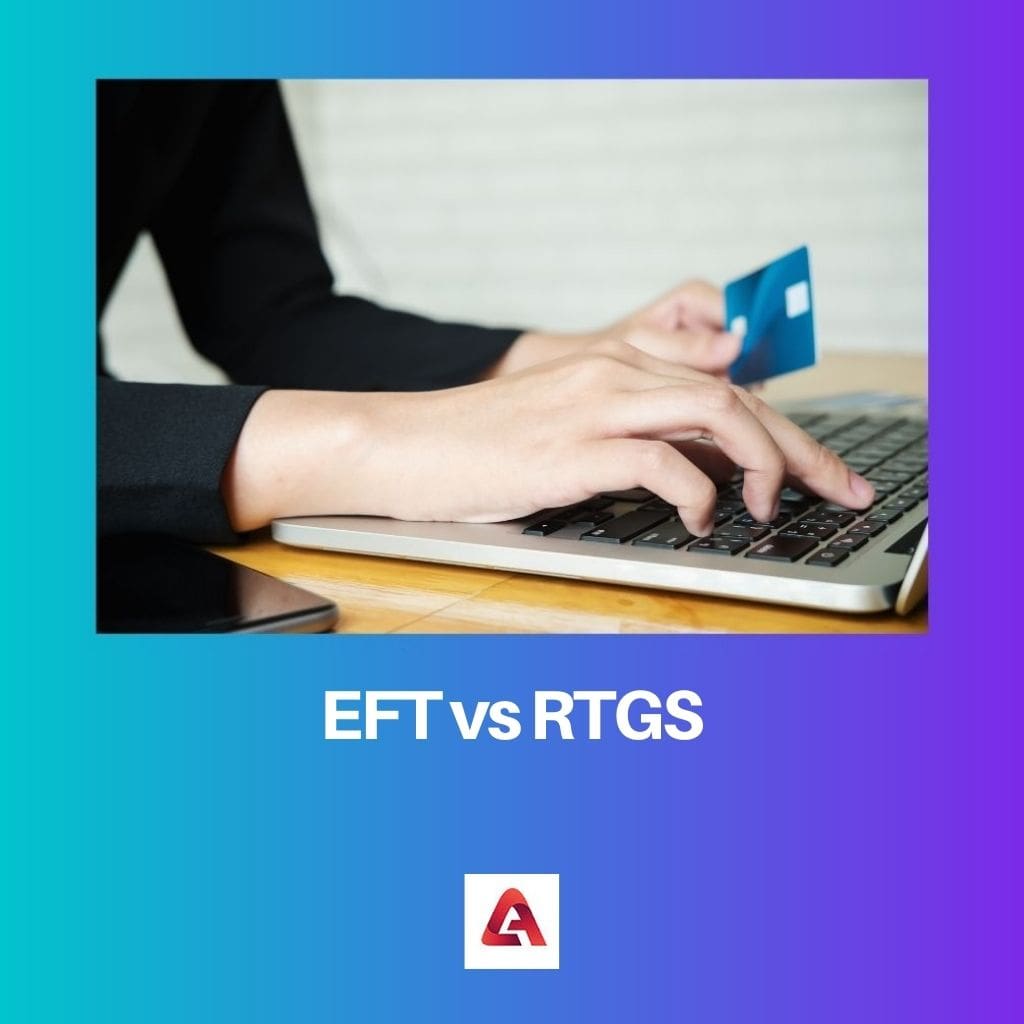EFT (Electronic Funds Transfer) and RTGS (Real-Time Gross Settlement) are both electronic payment systems used for transferring funds between bank accounts. EFT typically involves the batch processing of transactions, which may take several hours or even days to complete, depending on the system and the banks involved. In contrast, RTGS allows for immediate, real-time settlement of transactions, making it ideal for high-value and time-sensitive transfers where funds are moved individually and settled instantly. RTGS systems are often used for large financial transactions between banks or financial institutions due to their speed and security.
Key Takeaways
- EFT (Electronic Funds Transfer) is a generic term for electronic money transfers between bank accounts; RTGS (Real-Time Gross Settlement) is a specific system for high-value, time-sensitive fund transfers.
- EFT transactions can include various types and amounts of transfers; RTGS transactions involve immediate settlement and require a minimum transaction amount.
- EFT and RTGS facilitate electronic fund transfers, but RTGS is designed for larger, urgent transactions and offers faster settlement times.
EFT vs RTGS
EFT and RTGS differ because an EFT transaction is settled individually on any amount, and there is no minimum value. In contrast, RTGS transactions mainly focus on a significant amount of weight and are paid in real time.

Electronic Fund Transfer (EFT) is a settlement scheme under which the settlements happen in a batch process at the end of the day. Real-Time Gross Settlement (RTGS) As the name indicates, a real-time payment in RTGS is made.
Comparison Table
| Feature | EFT (Electronic Funds Transfer) | RTGS (Real-Time Gross Settlement) |
|---|---|---|
| Definition | A system for electronically transferring funds between bank accounts. | A system for immediate and continuous settlement of electronic fund transfers. |
| Speed | Varies, but typically within a few hours or the next business day. | Instantaneous (funds are transferred and available within seconds). |
| Minimum Transfer Amount | No minimum limit, but some banks may have limitations. | Typically much higher minimum limit (e.g., ₹2 lakhs in India). |
| Maximum Transfer Amount | No maximum limit. | No maximum limit, but banks may have internal limits. |
| Suitable for | Small and medium-sized transactions, recurring payments, individual transfers. | Large and urgent transactions, high-value payments, time-critical transfers. |
| Cost | Generally lower fees compared to RTGS. | May involve higher fees due to guaranteed and faster settlement. |
| Availability | Available during banking hours and on designated working days. | Available during specific time windows (e.g., 9:00 AM to 4:30 PM in India) on working days. |
| Examples | Sending money to a friend, paying bills online, transferring salary. | Making large interbank transfers, bulk payments to vendors, high-value investments |
What is EFT?
Transferring money from one bank account to another in an electronic mode is called Electronic Fund Transfer. The bank accounts may belong to the same or different banks.
Electronic Fund Transfer is also done through the ACH network. Electronic Funds Transfer is secured because of PIN (Personal Identification Number) and the login details, which are known only to the customer.
Also, the manual intervention of someone depositing the cheque and its clearance is avoided. There are significantly fewer administrative procedures, saving time and energy.
There are many ways to transfer money electronically; EFT includes Direct deposit, Wire transfers, ATMs, Debit cards, Electronic checks, Pay-by-phone systems and online banking.
Usually, you cannot stop an EFT payment after initiating it; if you need to stop payment or refund the amount, it’s between you and the person paid. However, we might be able to control scheduled costs, such as utility bills and recurring by notifying the financial institution to begore three business working days.
Before initiating EFT, payment or using it, check with the bank or financial institution for policies, stop payment details, applicable charges for each transaction, minimum and maximum amount and business hours of the transaction.

What is RTGS?
RTGS is one of the fund transfer systems which facilitates the real-time transfer of funds. RTGS is considered to be the fastest fund transfer method offered by banks.
It is an instant transfer, and the bank that is supposed to receive the funds from the remitting bank has it remitted in seconds. The bank is expected to deposit the funds within 30 minutes of the transfer message.
RTGS also allows setting up the transfer at a later point in time. The value date of the transaction shall be analysed, and the transfer will be made from the queue.
There may be rare cases of funds not getting credited to the said account. In such cases, the funds shall reach the remitting bank.

Main Differences Between EFT and RTGS
- The main difference between EFT and RTGS is that EFT is based on net settlement, meaning that the transactions are completed in batches at specific times, and all transfers will be held up until a particular time. At the same time, RTGS is real-time and happens individually.
- EFT involves smaller value transactions; the maximum amount can be 2 Lakhs INR. At the same time, RTGS’ minimum transaction value starts from 2 Lakhs INR.
- The process of EFR is one working day, while RTGS processes in real-time (‘push’ transfer) EFT is slower, with fewer transaction charges than RTGS.
- EFT is best for small-value transactions, and RTGS is appropriate for many transactions.
- EFT takes time to transfer funds, depending on the bank’s transaction timelines, but RTGS is an instant fund transfer mechanism.

- http://www.ijrra.net/Vol2issue3/IJRRA-02-03-26.pdf
- https://krishikosh.egranth.ac.in/handle/1/5810055874

The comparison between EFT and RTGS makes it evident how technology has revolutionized financial transactions.
Absolutely, the advancements in electronic fund transfers have significantly impacted banking services and customer experiences.
On the other hand, it also raises concerns about cybersecurity and privacy, which are becoming increasingly important in the digital era.
I find the discussion on EFT and RTGS to be enlightening, showcasing how financial institutions have embraced technological advancements to improve services.
It’s interesting to see how this evolution has impacted not just banking operations but also customer behaviors and expectations.
However, it’s essential to address the challenges arising from this digital transformation, such as cybersecurity threats and financial inclusion disparities.
The article does a great job of explaining a complex topic in an easily understandable manner.
I couldn’t agree more, the article’s clarity is commendable and makes it accessible to a wide audience.
I found the content to be oversimplified, lacking depth for those familiar with banking operations.
The article effectively outlines the operational processes of EFT and RTGS, offering a foundational understanding of these essential financial mechanisms.
The in-depth explanation enables readers to grasp the technical aspects of these systems, which are obscured by financial jargon and complexities.
The article’s explanation of EFT and RTGS is thorough and concise, valuable for both financial professionals and individuals seeking to understand these concepts.
Absolutely, the clarity and depth of the content cater to various levels of familiarity with financial processes.
Although it might benefit from more engaging language and storytelling elements to maintain readers’ interest throughout the article.
The article is informative and well-structured, providing a comprehensive understanding of EFT and RTGS.
I agree, the comparison table is particularly useful to grasp the key differences between the two methods.
Banks are vital for economic stability and individual financial empowerment, and this article did an excellent job of explaining the differences between EFT and RTGS.
The comprehensive comparison table effectively demonstrates the nuances between EFT and RTGS, making it easier to grasp the intricacies of these systems.
Indeed, the table is quite informative and aids in understanding the specific use-cases for each transfer method.
However, it might benefit from more visual aids to complement the textual descriptions and enhance comprehension.
While banks are indeed crucial for our economy, I would have appreciated more real-world examples to illustrate the concepts discussed.
I understand your point, but this article’s focus seems to be on the technical aspects rather than practical applications.
The article offers a valuable overview of EFT and RTGS, shedding light on their operational differences and implications.
Yes, it highlights the significance of digital payment systems in today’s financial landscape.